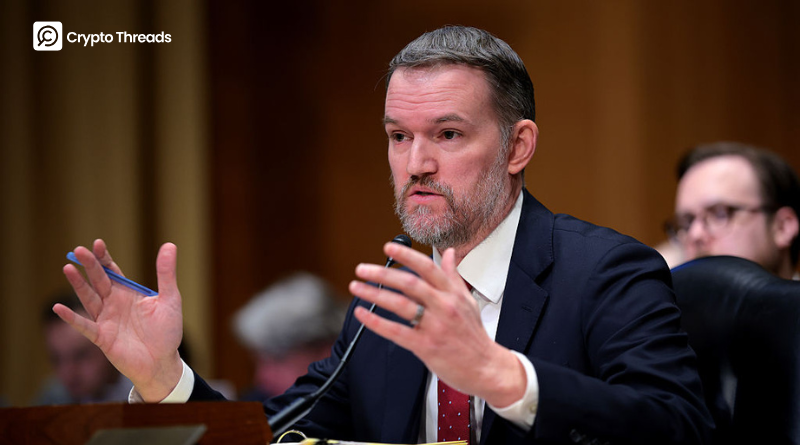US Launches Investigation into Brazil’s Digital Payment System
Key Takeaways
- The US has launched a formal investigation into Brazil’s digital trade practices, focusing on the Pix instant payment system
- President Trump threatened 50% tariffs on Brazilian imports and criticized Brazil’s treatment of American tech companies
- Pix, Brazil’s government-run payment system, has over 150 million users and processes payments at 60+ million businesses
- The investigation examines whether Brazil unfairly disadvantages US financial companies like Mastercard and Visa
- Brazil’s participation in BRICS payment initiatives represents a broader challenge to US dollar dominance
Investigation Overview
The United States has initiated a comprehensive investigation into Brazil’s digital trade practices, with particular attention on the country’s Pix instant payment system that has rapidly transformed Brazil’s financial landscape. US Trade Representative Jamieson Greer announced the probe on Tuesday, signaling growing tensions between the two nations over digital commerce and financial sovereignty.
The investigation will examine Brazil’s trade policies to determine whether they create unfair disadvantages for American companies. Greer specifically highlighted concerns about Brazil’s “tariff and non-tariff barriers” and alleged preferential treatment given to other trading partners while disadvantageous to US exporters.
The Pix Payment Revolution
Brazil’s Central Bank launched Pix in 2020 as a government-operated instant payment system that enables users to transfer money instantly, 24/7, with minimal or no fees. The system allows direct transfers through mobile applications, QR codes, or account identifiers, completely bypassing traditional credit card networks.
The rapid adoption of Pix has been remarkable, with over 150 million users and acceptance at more than 60 million businesses across Brazil. In just five years, it has become the primary payment method for transactions ranging from street vendor purchases to utility bill payments, fundamentally reshaping Brazil’s digital economy.
The US investigation will scrutinize whether Brazil has been providing preferential treatment to its domestic payment system at the expense of established American alternatives, including Mastercard, Visa, and other US-based financial technology companies.
Political and Tech Company Tensions
The investigation encompasses broader concerns about Brazil’s treatment of American technology firms, particularly regarding content moderation policies. In August 2024, Brazil’s Supreme Federal Court ordered a nationwide suspension of the social media platform X after Elon Musk refused to appoint a legal representative in the country, highlighting ongoing disputes over political speech censorship.
These tensions escalated when President Trump publicly called for Brazilian authorities to halt the prosecution of former President Jair Bolsonaro, describing it as a “witch hunt.” Trump subsequently threatened the current investigation in a letter to Brazilian President Luiz Inácio Lula da Silva, accompanied by warnings of 50% tariffs on Brazilian imports.
Global Financial Implications
While Pix operates exclusively within Brazil’s domestic market, it represents part of a larger trend that concerns US officials. Cryptocurrency-fintech bridges enable global users to send stablecoins and settle instantly into Brazilian bank accounts through Pix, effectively bypassing traditional financial infrastructure including the SWIFT system, PayPal, and US remittance services like Western Union.
The implications extend beyond bilateral trade disputes. As a member of the BRICS economic bloc alongside Russia, India, China, and South Africa, Brazil participates in coordinated efforts to reduce dependence on the US dollar and Western financial systems.
BRICS and Alternative Financial Systems
In 2024, BRICS leaders adopted “BRICS Pay,” a cross-border payments platform designed to circumvent SWIFT and facilitate transactions in local currencies. During a recent BRICS Summit in Rio de Janeiro, member nations discussed creating a joint reserve currency as an alternative to the US dollar, a development that reportedly drew strong opposition from US leadership.
These initiatives represent a fundamental challenge to the traditional Western-dominated financial architecture, with Brazil’s Pix system serving as a key component in this broader geopolitical shift toward financial independence.
Economic and Strategic Considerations
The investigation reflects deeper concerns about America’s position in the global financial system as emerging economies develop alternative payment infrastructures. Brazil’s success with Pix demonstrates how government-backed digital payment systems can rapidly displace private-sector competitors and reduce reliance on traditional financial intermediaries.
The outcome of this investigation could set important precedents for how the United States responds to similar digital payment initiatives in other countries, particularly those seeking to reduce their dependence on US-controlled financial infrastructure.
As Brazil continues to expand its digital payment capabilities and strengthen ties with BRICS partners, the investigation represents a critical moment in the evolving landscape of international digital commerce and financial sovereignty.



